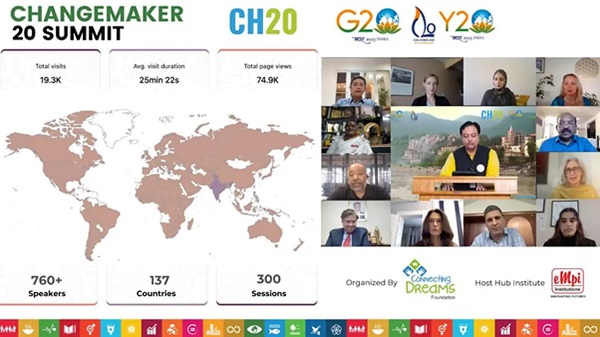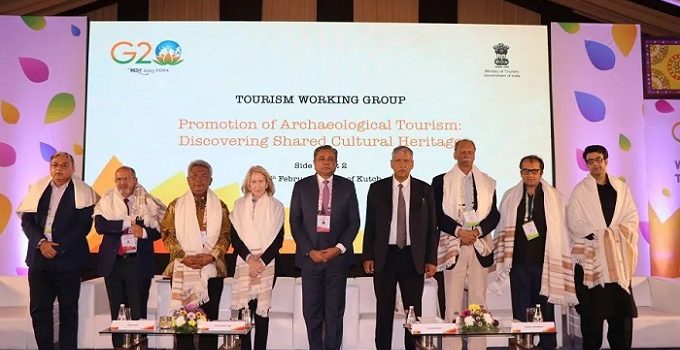Spanning a record-setting 122 hours from August 15th to August 20th, 2023, the summit has set unparalleled milestones in global collaboration and empowerment, leaving an indelible mark on the world stage.
A Confluence of Changemaking Powers
The summit, organized by Connecting Dreams Foundation under the G20 Presidency of India and in partnership with Civil 20 and Youth 20 engagement groups, brought together participants from an astonishing 137 countries. The digital gathering featured over 760 luminous speakers including stalwarts like Ah Maftuchan, C20 Sherpa Indonesia; Athayde Motta from Brazil; Ela Ionescu of UN Women; Fiona Mcrath from Bezos Earth Fund; Padma Shri Manjamma Jogathiand and the Padmavibhushan Sh Dr. D V Veerendra Hegde from Dharmasthala, among many others.
Seamless Synergy: Unity, Determination, and Global Impact
Dr. Amit Tuteja, Founder of Connecting Dreams Foundation and a fervent advocate for social entrepreneurship and youth empowerment, praised the summit’s monumental achievement.
“In these unprecedented times, the need for global unity and sustainable action has never been more critical. It’s an honor to see 137 countries come together to share, learn, and commit to a more equitable future,” said Dr. Amit Tuteja.
A Tapestry of Global Perspectives
With themes ranging from climate action and economic inclusion to gender equality and youth empowerment, the summit showcased a rich tapestry of global perspectives. Over 300 captivating sessions were spread across 10 themes, culminating in a record-setting 74,900 hits over the five days, a testament to the summit’s global influence and deep engagement from participants committed to meaningful discourse.
The Architectural Marvel of Youth-Led Teams
The real heroes behind this mammoth event were the youth-led teams, who seamlessly orchestrated the summit, including the students and volunteers of EMPI Institute. Their unwavering support played a pivotal role in ensuring the summit’s triumph. Their unity, determination, and collaborative spirit not only fueled the summit but will also continue to drive its legacy.
Local Solutions, Global Resonance
Aligned with G20, C20, and Y20 principles, the summit provided a unique platform to discuss and develop solutions that not only have global resonance but also drive grassroots change. It underscored the power of collaboration across sectors including academia, business, civil society, and government, thereby highlighting the essence of the Collective Impact.
Key Highlights and Discussions
- Technology and Accessibility: The summit led candid conversations on the need for inclusive digital platforms that cater to people with various impairments, thereby driving market expansion and innovation.
- Quality Education and Skill Development: Socio-Emotional Learning (SEL) was recognized as an essential curriculum element to help students and teachers regulate stress and anxiety. Automated assessment for SWOT analysis also took center stage as a powerful tool for personalized student growth.
- Economic Inclusion and Poverty Alleviation: The success of NRLM over the past decade was showcased as an effective means of women’s empowerment and income generation for the economically marginalized.
- Sustainable Agriculture and Climate Change: The summit highlighted innovative farming practices like vertical farming and precision agriculture as key drivers for sustainable development.
- Healthcare: Advances in genomics, personalized medicine, and telehealth were discussed as revolutionary steps in expanding medical access and improving patient care.
The Global Changemaker Collective: A Vision for the Future
One of the summit’s most significant announcements was the formation of the Global Changemaker Collective. Designed as a collaborative platform, the collective aims to bring together changemakers, irrespective of geographic or demographic divides. “This collective will serve as a cradle for ideas and a loudspeaker for unheard voices. It is our commitment to come together, magnify our collective strengths, and make dreams a reality,” affirmed Dr. Tuteja.
Next Steps
The CDF plans to roll out more details about the Global Changemaker Collective in the coming weeks, with an open invitation for people, organizations, and governments to join in. “Collaboration is our biggest asset. By working together as a unified collective, we can turn dreams into tangible impact,” Dr. Tuteja added.
Acknowledgements and Conclusions
The Connecting Dreams Foundation extends its deepest gratitude to all speakers, participants, and collaborators, including partners like EMPI Institute, who made this event a resounding success. “We’re not just concluding a summit; we’re opening a new chapter of possibilities,” concluded Dr. Tuteja.
About Connecting Dreams Foundation
Connecting Dreams Foundation, under the visionary guidance of Dr. Amit Tuteja, stands as a leading nonprofit organization ardently committed to fostering positive social change, empowerment, and sustainable development. Through groundbreaking initiatives like Apna Tech Tree, CDF College Changemaking Labs, and the Global Changemaker Fellowship, the foundation aims to create a better world for present and future generations.
Website:
1. Changemaker20 Summit
https://www.changemaker20.org/CH20
2. Connecting Dreams Foundation
Together, We Are Changemakers.
At a time when the world grapples with myriad challenges, the Changemaker20 Summit serves as a testament to what we can achieve when we unite for a common cause. The summit’s overarching success is not an end but merely the beginning of a transformative journey towards global sustainable development.
For further information, please visit [https://connecting-dreams.org] or write to us at [info@connecting-dreams.org].
Founder – Connecting Dreams Foundation
amit@connecting-dreams.org
+91-9899748528






